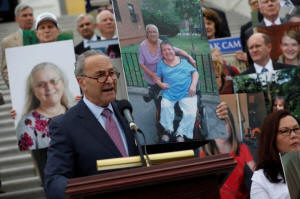|
Senate Republicans struggle to salvage
healthcare effort
 Send a link to a friend
Send a link to a friend
 [June 29, 2017]
By Susan Cornwell and Yasmeen Abutaleb [June 29, 2017]
By Susan Cornwell and Yasmeen Abutaleb
WASHINGTON (Reuters) - The top U.S. Senate
Republican struggled on Wednesday to salvage major healthcare
legislation sought by President Donald Trump, meeting privately with a
parade of skeptical senators as critics within the party urged
substantial changes.
Republican leaders hope to agree on changes to the legislation by Friday
so lawmakers can take it up after next week's Independence Day recess..
Senate Majority Leader Mitch McConnell on Tuesday abandoned plans to
seek passage of it this week because Republicans did not have 50 votes
to pass the bill.
For seven years, Republicans have led a quest to undo the 2010 law known
as Obamacare, Democratic former President Barack Obama's signature
legislative achievement. Trump made dismantling it a top campaign
promise during last year's presidential campaign but policy differences
within the party have raised doubts Republicans can achieve a repeal.

Democrats have unified against the bill and Republicans control the
Senate by a slim 52-48 margin, which means McConnell can afford to lose
only two Republicans. So far at least 10 - including moderates and
hard-line conservatives - have expressed opposition to the current bill,
although some indicated they would vote for it with certain changes.
McConnell, with his reputation as a strategist on the line, met with a
procession of Republican senators in his office on Wednesday. John
Cornyn, the No. 2 Senate Republican, said party leaders will talk to
every Republican senator who has concerns about the bill or is
undecided.
The House of Representatives passed its healthcare bill last month, only
after striking a balance between the center of the party and the right
wing. Now McConnell must find a similar sweet spot.
During a lunch meeting on Wednesday Republicans made presentations on
potential fixes. Senator Rand Paul called for jettisoning more parts of
Obamacare to get conservatives on board.
TAX ISSUE
Senator Mike Rounds suggested keeping a 3.8 percent Obamacare tax on
high earners' investment income, which the current bill would eliminate.
Rounds said the tax could pay for more Americans to receive the tax
credits that help pay for health insurance.
Senator Bob Corker, who also supports keeping the tax, said one of the
issues he was focused on was helping lower-income Americans pay for
health plans.
"My sense is there's a good chance that issue and other issues people
are trying to get addressed can be addressed," Corker told reporters.
Trump said the bill was moving along well and predicted a "great, great
surprise" but did not elaborate.
[to top of second column] |

Senate Minority Leader Chuck Schumer speaks at a press conference
about the ongoing efforts to repeal the Affordable Care Act outside
the U.S. Capitol Building in Washington, D.C., U.S., June 27, 2017.
REUTERS/Aaron P. Bernstein

Maine Senator Susan Collins, a moderate, said it would be "very
difficult" to reach agreement by Friday. Collins and other centrists
were put off by the nonpartisan Congressional Budget Office's
projection on Monday that 22 million people would lose medical
insurance under the existing bill.
Finishing the legislation's revisions by Friday would be "optimal,"
Cornyn said, so the CBO can analyze the new version..
Even then, Democrats could mount a forceful resistance. They have
repeatedly said they will not discuss a repeal but have expressed
openness to negotiating improvements.
The Senate's top Democrat, Chuck Schumer, proposed Trump call all
100 senators to Blair House across the street from the White House
to craft a bipartisan bill fixing Obamacare but Trump said did not
think Schumer's offer was serious.
McConnell said Democrats had refused "to work with us in a serious
way to comprehensively address Obamacare's failures in the seven
years since they passed it."
The legislation has triggered protests at the Capitol and police
said they arrested 40 people, including cancer survivors, on
Wednesday for blocking Senate offices.
Obama's 2010 Affordable Care Act, which passed without Republican
support, expanded health insurance coverage to some 20 million
people but Republicans call it a costly government intrusion.

The Senate bill rolls back Obamacare's expansion of the Medicaid
government insurance for the poor and cuts planned Medicaid spending
starting in 2025. It also repeals most of Obamacare's taxes, ends a
penalty for not obtaining insurance and overhauls subsidies that
help people buy insurance with tax credits.
(Additional reporting by Susan Heavey, Richard Cowan, Susan
Cornwell, Steve Holland, Jeff Mason, Mohammad Zargham, Tim Ahmann
and Jeff Mason; Writing by Lisa Lambert, Will Dunham and Frances
Kerry; Editing by Bill Trott)
[© 2017 Thomson Reuters. All rights
reserved.]
Copyright 2017 Reuters. All rights reserved. This material may not be published,
broadcast, rewritten or redistributed. |